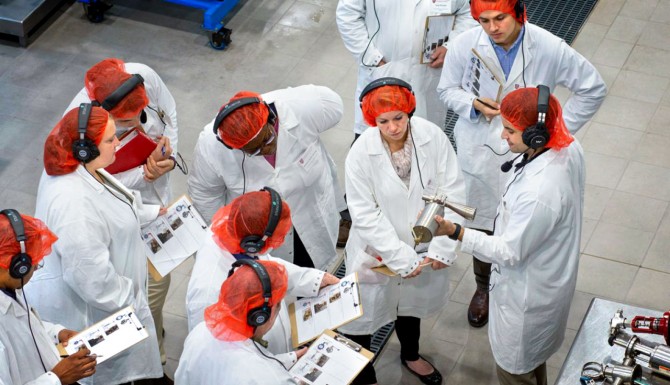Institute for Food Safety to offer first in-state FDA training
By Erin Rodger
New York state is ranked second in the nation for food processing, according to the USDA Economic Research Service, and collaborations between the New York State Department of Agriculture and Markets (NYS AGM), the Food and Drug Administration and Cornell’s Institute for Food Safety (IFS@CU) have played an important role.
To ensure regulatory compliance by New York’s food processing facilities, more than 200 food inspectors need access to Food and Drug Administration (FDA) trainings developed for the implementation of the new regulations set forth by the Food Safety Modernization Act (FSMA).
For that reason, representatives of the NYS AGM, in partnership with the FDA and IFS@CU, directed by Olga Padilla-Zakour, professor of food science, have worked together to create more accessible in-state training opportunities through IFS@CU.
“The success of this partnership comes after more than four years of internal discussions, attendance to trainings and hundreds of hours dedicated by several colleagues from our department,” Padilla-Zakour said.
On Feb. 12, the FDA awarded New York state and IFS@CU the ability to host the FDA’s Food Current Good Manufacturing Practice, Application and Evidence Development course (FDA-190) independently in the future.
“This new course serves as a wonderful example of our strong, collaborative partnership with the FDA and the Institute for Food Safety and provides for a more consistent and uniform application of how food safety requirements are regulated,” said Jennifer Trodden, deputy commissioner at NYS AGM. “This collaborative effort will result in regulatory food safety professionals receiving this crucial, fundamental training, ultimately improving the state and nation’s food supply.”
FSMA was approved into law in 2011 but enforcement of the new regulation was introduced in a stepwise and guided fashion, in order to allow food companies and regulatory personnel to adapt to the new requirements. The overarching goal of FSMA is to prevent food-safety risks throughout the food system, from farming to food manufacturing and distribution.
“FSMA has raised the bar in food safety over the past decade,” said Bruno Xavier, senior extension associate at Cornell AgriTech. “Under the new rule, state food inspectors can play an important role in helping food businesses identify and apply the appropriate safety measures, and enforce regulations more effectively when they observe serious scenarios that could affect human health and safety.”
That’s why training inspectors to understand FSMA rules is critical, and the pressure is on regulatory agencies to provide this training to their inspectors so that the industry they serve are adequately prepared to implement the FSMA rules. While the FDA has provided training opportunities to New York state each year, logistical challenges and limitations in the number of training spots available have made it difficult to train more than four to five inspectors a year, compared with the 20 to 30 inspectors that are needed.
The more accessible in-state course, to be taught by Xavier at Cornell AgriTech and NYS inspector Kimberly Liddell, was chosen because it provides an overview of the FSMA’s Preventive Controls for Human Food Rule’s Good Manufacturing Practices. Xavier will provide guidance on how to apply parts of this regulation as it relates to manufacturing, storage and distribution operations.
Additionally, he will help inspectors determine whether a business’s processes and controls ensure safe manufacture, storage and distribution of food products and what to do when they are not deemed safe. This includes how to collect and document evidence to support regulatory action and how to write detailed objectionable conditions and statements of observation.
“The training provided through the course will serve as a prerequisite for most other specialized training classes offered by the FDA to state inspection staff,” Trodden said. “Because of our ability to offer this course independently, in-state and out-of-state inspectors will be afforded the opportunity to gain access to other higher-level food safety classes offered by the FDA. Having trained and skilled state inspectors is another step towards ensuring the success of New York’s vibrant food industry.”
Erin Rodger is senior manager of marketing and communications at Cornell AgriTech.
Media Contact
Get Cornell news delivered right to your inbox.
Subscribe


